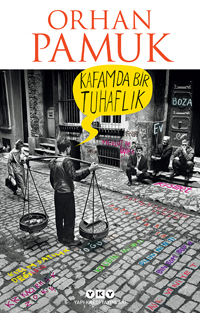It's a short flight, but I'm hoping to finish reading my book. Helena asks me about the flying turtles on the cover. My edition of
The Lathe of Heaven, by Ursula K. Le Guin, has flying turtles on the cover. I can't say I even noticed them.
Oh, right, I say. They're not actually turtles, they're aliens. But they're a bit odd, as aliens go, cuz this guy just dreamed them up. He has these dreams that come true, only they don't exactly "come true," just he wakes up and everything in his dream has always been true, so nobody notices when things change. So he dreamt there were aliens on the Moon, but then it was suggested to him to dream that they weren't on the Moon anymore, so suddenly they're invading the Earth, but then he dreams that it was all a big misunderstanding. They're not really turtles, it's more like an armour, or a spacesuit so they can deal with the atmosphere. And they communicate through their left elbow. At which point I'm flapping my own left elbow up near my ear to demonstrate. And Helena says, "And you think
I'm weird."
It's a terrific idea book, and I was guessing that it was from earlier in Le Guin's career, but that turns out to be not true. (It was published in 1971.) I was assuming earlier because it totally feels like it's from an earlier era — it's like Philip K. Dick and Robert Sheckley with a Twilight-Zone vibe. There's a naïve idealism at work, and an underlying Cold War threat of nuclear war. On further reflection though, I realize that
The Lathe is a mature and even subtle novel (despite my clumsy rehash of it here) about the nature of (our) reality(s).
So George Orr is having these dreams, and he wants to stop having these dreams, so he's taking illegally obtained drugs to suppress his dream state and when he ODs, the police refer him to compulsory psychological treatment. But Dr Haber's more interested in controlling the dreams than in curing George of them, and George is pretty much at his mercy.
"You can't go on changing things, trying to run things."
"You speak as if that were some kind of general moral imperative." He looked at Orr with his genial, reflective smile, stroking his beard. "But in fact, isn't that man's very purpose on earth — to do things, change things, run things, make a better world?"
"No!"
"What is his purpose, then?"
"I don't know. Things don't have purposes, as if the universe were a machine, where every part has a useful function. What's the function of a galaxy? I don't know if our life has a purpose and I don't see that it matters. What does matter is that we're a part. Like a thread in a cloth of a grass-bade in a field. It is and we are. What we do is like wind blowing on the grass."
There was a slight pause, and when Haber answered his tone was no longer genial, reassuring, or encouraging. It was quite neutral and verged, just detectably, on contempt.
"You're of a peculiarly passive outlook for a man brought up in the Judeo-Christian-Rationalist West. A sort of natural Buddhist. Have you ever studied the Eastern mysticisms, George?" The last question, with its obvious answer, was an open sneer.
"No. I don't know anything about them. I do know that it's wrong to force the pattern of things. It won't do. It's been our mistake for a hundred years."
Le Guin has drawn some great characters that are in sharp contrast to one another — George the dreamer, Haber the rationalist, and Heather, lawyer and George's love interest in some realities, is mostly just human, to bear the consequences and bring the others into relief. George has terrific strength of character; he carries an immense weight and tremendous sadness.
Early on George wonders if there might be other dreamers out there who can effect realities as he does, but no one cares to entertain this question too seriously. Apart from this ability, George is a very average guy. Allegorically this novel's message, trite but true, might be that anybody can change reality if they dream it so, and that even the smallest change can have a large impact. The simplest suggestions may have complex interpretations. And you can never go back.
Beyond this, the novel propounds a Buddhist mentality, embracing stillness over change, and being a part rather than apart.
The Lathe doesn't exactly end well, but it ends mostly right; that is, it ends.
Read this excellent
excerpt.




